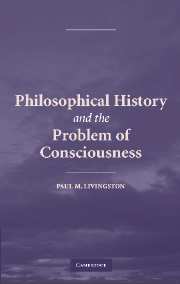Book contents
- Frontmatter
- Contents
- Preface
- Acknowledgments
- 1 Introduction: Philosophical History and the Problem of Consciousness
- 2 Structuralism and Content in the Protocol Sentence Debate
- 3 Husserl and Schlick on the Logical Form of Experience
- 4 Ryle on Sensation and the Origin of the Identity Theory
- 5 Functionalism and Logical Analysis
- 6 Consciousness, Language, and the Opening of Philosophical Critique
- Notes
- Works Cited
- Index
1 - Introduction: Philosophical History and the Problem of Consciousness
Published online by Cambridge University Press: 16 July 2009
- Frontmatter
- Contents
- Preface
- Acknowledgments
- 1 Introduction: Philosophical History and the Problem of Consciousness
- 2 Structuralism and Content in the Protocol Sentence Debate
- 3 Husserl and Schlick on the Logical Form of Experience
- 4 Ryle on Sensation and the Origin of the Identity Theory
- 5 Functionalism and Logical Analysis
- 6 Consciousness, Language, and the Opening of Philosophical Critique
- Notes
- Works Cited
- Index
Summary
The history of analytic philosophy, if viewed as more than a repository for superseded theory, could provide the basis for a transformation in the problem of consciousness with which philosophers of mind are currently grappling. Philosophers of mind seldom discuss or investigate, more than cursorily, the history of the interrelated concepts of mind, consciousness, experience, and the physical world that they rely upon in their theorizing. But these concepts in fact emerge from some of the most interesting and decisive philosophical struggles of the analytic tradition in the twentieth century. Historically, these struggles and their results set up the philosophical space in which contemporary discussion of consciousness moves, defining and delimiting the range of theoretical alternatives accessible to participants in the discussion of the explainability of consciousness and its relation to our understanding of the physical world.
Most contemporary philosophical discussions of consciousness address the question of its explainability in terms of objective, scientific description or the question of its ontological reducibility to objective, scientifically describable phenomena. Philosophers often raise these questions, moreover, against the backdrop of the thought that consciousness has certain properties or features that may make it especially resistant to scientific explanation and description. Paramount among the features of consciousness usually cited as problems for its explanation or reduction are its privacy, subjectivity, ineffability, phenomenality, immediacy, and irreducibly qualitative character.
Information
- Type
- Chapter
- Information
- Publisher: Cambridge University PressPrint publication year: 2004
